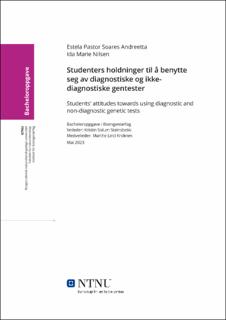| dc.contributor.advisor | Steinsbekk, Kristin Solum | |
| dc.contributor.advisor | Kroknes, Marthe Lind | |
| dc.contributor.author | Andreetta, Estela Pastor Soares | |
| dc.contributor.author | Nilsen, Ida Marie | |
| dc.date.accessioned | 2023-07-05T17:20:06Z | |
| dc.date.available | 2023-07-05T17:20:06Z | |
| dc.date.issued | 2023 | |
| dc.identifier | no.ntnu:inspera:146722497:148998090 | |
| dc.identifier.uri | https://hdl.handle.net/11250/3076319 | |
| dc.description.abstract | Formålet med denne bacheloroppgaven var å kartlegge studenters holdninger knyttet til bruk av diagnostiske og ikke-diagnostiske gentester, og finne svar på om studenter er interessert i større tilgjengelighet av ikke-diagnostiske gentester. Hva tenker de rundt hvilke konsekvenser det å ta en gentest kan ha for den som tester seg og for deres nære slekt?
Det ble utført en holdningsundersøkelse blant norske universitetsstudenter ved å benytte et spørreskjema laget på nettskjema.no. 225 studenter deltok i undersøkelsen, hvorav 34 var menn, 189 var kvinner og 2 var annet. Spørreskjemaet ble delt gjennom Facebook med bekjente og sendt på E-post til andre bioingeniørutdanninger i Norge
Resultatene fra spørreundersøkelsen viste at 72,9% av respondentene ville tatt en gentest selv om de var friske. Av disse ville 81,1% helst utført en gentest innen helsetjenesten i samråd med helsepersonell. Flertallet av respondentene svarte at de ikke ville benyttet seg av en DTC-GT, noe som kan være på grunn av mindre tillit til databehandling hos private aktører, og at man i offentlig helsetjeneste får tilbud om genetisk veiledning. I tillegg mente 81,3 % at resultater fra en gentest kan påvirke familien sin.
Hovedfunnene i undersøkelsen viser at studenter var interesserte i å ta en gentest selv når de var friske. Dette ville de hovedsakelig gjort innenfor offentlig helsetjeneste grunnet et ønske om samråd med helsepersonell og at tilliten til det offentlige er større enn tilliten til private aktører. Holdningene til studenter angående diagnostisk og ikke-diagnostisk bruk av gentester er varsomt positive, både til bruk og økt tilgjengelighet. Likevel foretrekkes gentesting innenfor helsetjenesten, fremfor DTC-GT fra private aktører. Respondentene mener også at gentester de selv utfører kan påvirke familien, og resultater fra gentester utført av noen i familien kan påvirke dem. | |
| dc.description.abstract | The purpose of this Bachelor's thesis was to map out students' attitudes in relation to the use of diagnostic and non-diagnostic genetic tests, and to find answers regarding if students are interested in a greater accessibility of non-diagnostic genetic tests. What are students’ thoughts on the consequences that taking a genetic test can have on themselves and their close relatives?
A survey among Norwegian university students was conducted by using a questionnaire created on the website nettskjema.no. A total of 225 students took part in the survey, of which 34 were male, 189 were female, and 2 were other. The questionnaire was shared through Facebook with acquaintances and sent by email to other biomedical laboratory science programs in Norway.
The results of the survey showed that 72.9% of the participants would take a genetic test even if they were healthy. Among these participants 81.1% preferred to have the genetic test conducted within the healthcare system involving healthcare professionals. Most of the participants answered that they wouldn’t utilize a DTC-GT (Direct-to-Consumer Genetic Testing). This could be because of less trust in data handling done by private companies, as well as the fact that one, in the public healthcare system, is offered genetic counseling. Furthermore, 81.3% meant that results from a genetic test could affect their family.
The principal discoveries of the study display that students were interested in taking a genetic test even when they were healthy. They would primarily prefer to do so within the public healthcare system, as they value consultation with healthcare professionals and have greater trust in the public sector compared to private companies. Students' attitudes regarding the diagnostic and non-diagnostic use of genetic tests were carefully positive, both in terms of usage and increased accessibility. However, they preferred genetic testing within the healthcare system over DTC-GT from private companies. Participants also believed that the genetic tests they take could affect their family, and results from genetic tests done by family members could impact them as well. | |
| dc.language | nob | |
| dc.publisher | NTNU | |
| dc.title | Studenters holdninger til å benytte seg av diagnostiske og ikke-diagnostiske gentester | |
| dc.type | Bachelor thesis | |
